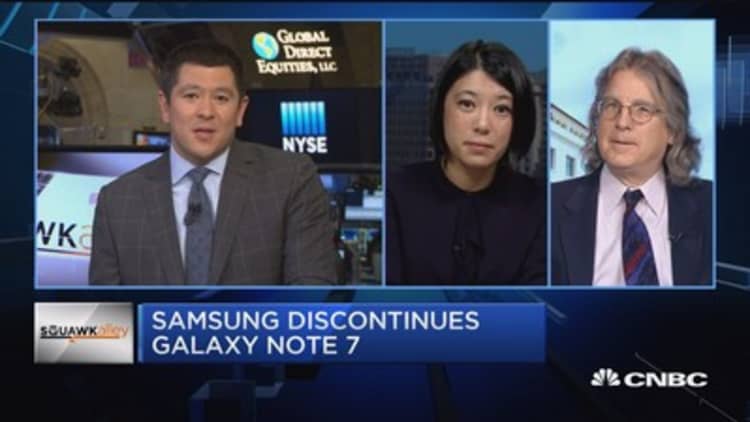
The pace of innovation has pushed smartphone makers to move product quickly — and anyone making a complex device could have made the mistake Samsung did, one technology investor told CNBC's "Squawk Alley" on Tuesday.
"I think it absolutely could happen to anybody," said Cheryl Cheng, a partner at BlueRun Ventures. "In a very short amount of time, we have gone to using smartphones and laptop computers to essentially having a computer in your pocket. So that pace of innovation has been very, very fast — faster than any other computer platform."
Samsung stopped sales, exchanges and production of the Galaxy Note 7, it announced this week, after a global recall failed to stem reports of batteries that overheated or caught fire. But with the ubiquity of the smartphone, people forget that smartphones have been popular for less than ten years, Cheng said.
Over that time period, the market has quickly and recently matured, meaning that growing sales isn't as easy as it used to be, Roger McNamee, co-founder of Elevation Partners, told "Squawk Alley" on Tuesday.
"I think that it's clear that Samsung cut corners," McNamee said. "And when you get a market that's mature, where sales are harder to come by, the temptations to cut corners increase. So I do think the risk is rising that you'll see things like this from other people."
Prismatic lithium ion batteries, like those used smartphones, require much more careful handling than conventional batteries, said Héctor Abruña, director of the Energy Materials Center at Cornell University, in an interview. Alignment of the layers must be very precise to prevent direct contact of the components, Abruna said, a growing challenge as smartphone makers battle to make their products thinner and more appealing to compete and set themselves apart.
In an effort to save space and weight, Samsung likely tried to use a very thin separator and it turned out to be a little too thin, Abruna said. Because of that, there could have contact between two layers the electrodes, causing a short, which in turn gave rise to "thermal runaway," where overheating of the battery cannot be reversed. Samsung did not immediately respond to a request for comment.
Still, that pressure is no excuse for mishandling the batteries, which are known to be volatile, McNamee said. Indeed, Yingchao Yu, founder and CEO of battery technology start-up Lionano, did not let Samsung off very easy.
"Thermal runaway incidents have been largely avoided by the majority of battery manufacturers. This would suggest that rather than 'accidents' these events could be described as mistakes, both in design and in manufacturing," Yu said in an interview.
Because the smartphone market isn't growing as quickly, it will be much harder for Samsung to recover, McNamee said. Samsung said its is working diligently with the appropriate regulatory authorities and that safety remains a top priority for the company.
"The problem for Samsung is ... they resisted doing the right thing," McNamee said. "They tried to downplay the problems, and I think that has made this consumer problem a lot worse....I would not underestimate how bad this is for Samsung in the smartphone category."


